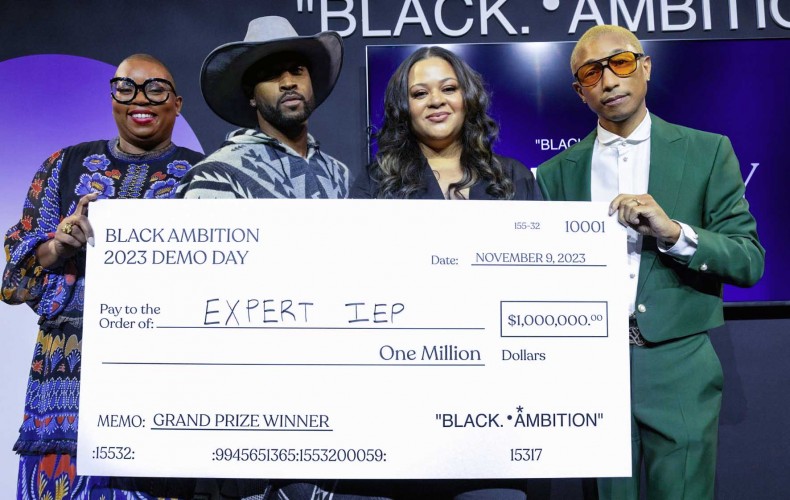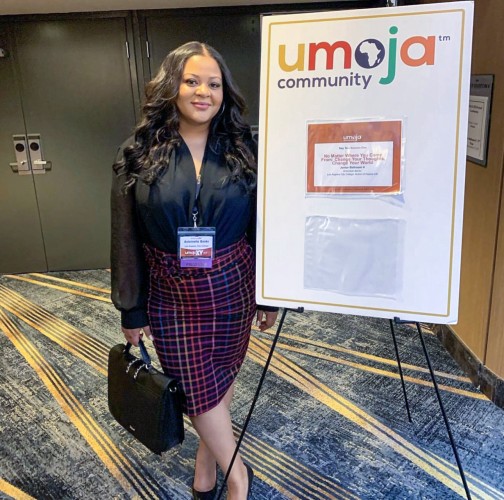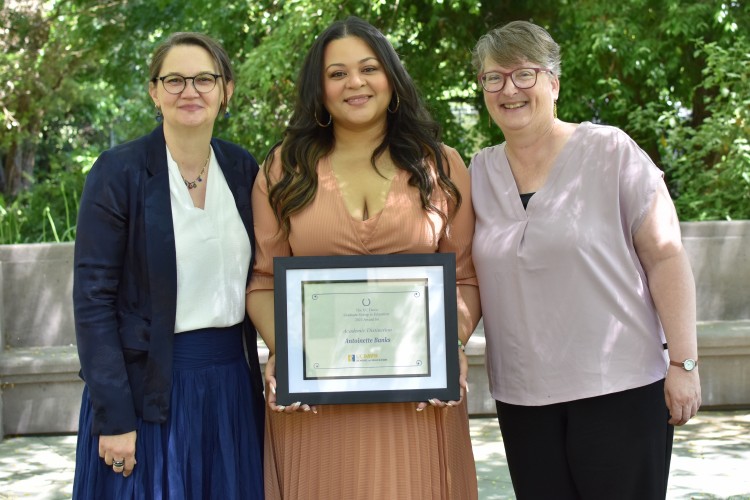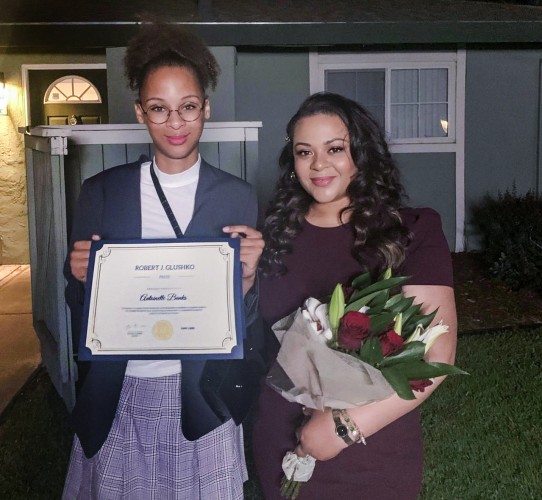PhD Student Antoinette Banks Wins $1 Million Black Ambition Prize
Award is for parent-facing app that uses predictive AI to optimize IEP plans
School of Education PhD student Antoinette Banks, BS ’22, has won the Pharrell Williams Black Ambition grand prize of $1 million for Expert IEP, her parent-facing app that uses predictive AI to optimize existing individualized education plans for children diagnosed with disabilities. Black Ambition is a nonprofit initiative dedicated to closing the opportunity and wealth gap by empowering Black and Hispanic entrepreneurs.
 School of Education PhD student
Antoinette Banks, BS ’22, has won the Pharrell Williams Black
Ambition grand prize of $1 million for Expert IEP, her
parent-facing app that uses predictive AI to optimize existing
individualized education plans for children diagnosed with
disabilities. Black Ambition is a nonprofit initiative dedicated
to closing the opportunity and wealth gap by empowering Black and
Hispanic entrepreneurs.
School of Education PhD student
Antoinette Banks, BS ’22, has won the Pharrell Williams Black
Ambition grand prize of $1 million for Expert IEP, her
parent-facing app that uses predictive AI to optimize existing
individualized education plans for children diagnosed with
disabilities. Black Ambition is a nonprofit initiative dedicated
to closing the opportunity and wealth gap by empowering Black and
Hispanic entrepreneurs.
Banks was named a semifinalist out of a group of over 2,000 applicants and went through a three-month mentorship program to become a finalist and then a top finalist selected to make the pitch that won her the grand prize at Black Ambition Demo Day in New York in November (watch a recording of the LinkedIn livestream event here).
“For so long Black and Brown kids with learning differences have been underestimated and forgotten,” said Banks. “Earning this $1 million prize puts our kids back in the forefront—it gets people thinking deeply about solving the problems in special education. As Founder and CEO, I am deeply grateful to Black Ambition for believing in me, holding space for me, and breaking down barriers.”
The Black Ambition grand prize caps a period of extraordinary accomplishment for Banks, who in 2021 received $150,000 from New Schools Venture Fund and in 2023 received a Ford Fellowship and won a $100,000 award as a Yass Prize Quarterfinalist for her Expert IEP app.
A Different Road to an Unexpected Career
Banks’ life has taken some unexpected turns. She attended Hollywood High School for the Performing Arts, and her first job was as a writer’s assistant for Suzanne de Passe at Showtime at the Apollo. She became a professional dancer, with a plan to become a doctor when her dancing career was over. “I wanted to eventually support people and their bodies,” she said. “But then I had my daughter unexpectedly, and she was autistic. I’d never even heard of autism before. It made me shift gears into wanting to support people and their minds instead.”
A single mother, Banks put her educational journey on hold to support herself and her daughter. She was providing advocacy and support services to families as an autism outreach director at nonprofit Hope So Bright in Southern California when one of her clients encouraged her to go back to school. “You’re really good at this,” she told Banks, “and I know you put your goals on hold to support your daughter, but I really think you should go back to school.” It was the encouragement Banks needed. She enrolled at Los Angeles City College and earned AA degrees in Social & Behavior Science and in Natural Science & Mathematics while advocating for her daughter’s rights.
 Banks was an organizer of the LACC
Umoja Program, and while presenting at an Umoja conference she
met visitors from UC Davis. “I thought I’d stay in Los Angeles to
finish my bachelor’s degree,” she said, “but I started looking
into UC Davis. I hadn’t seen another campus that had as much
representation for all the things that mattered to me the most,
as a student mother and a Black and Mexican woman. There was the
Center for African Diaspora Student Success, which Kayton Carter
had started and grown into something incredible to support Black
and African diaspora students. There was the Center for Chicanx
and Latinx Academic Student Success. And there was the MIND
Institute, which served students with autism. I thought, ‘If I’m
going to leave Los Angeles, Davis is where I’m going.’”
Banks was an organizer of the LACC
Umoja Program, and while presenting at an Umoja conference she
met visitors from UC Davis. “I thought I’d stay in Los Angeles to
finish my bachelor’s degree,” she said, “but I started looking
into UC Davis. I hadn’t seen another campus that had as much
representation for all the things that mattered to me the most,
as a student mother and a Black and Mexican woman. There was the
Center for African Diaspora Student Success, which Kayton Carter
had started and grown into something incredible to support Black
and African diaspora students. There was the Center for Chicanx
and Latinx Academic Student Success. And there was the MIND
Institute, which served students with autism. I thought, ‘If I’m
going to leave Los Angeles, Davis is where I’m going.’”
Banks transferred to UC Davis in 2020 to earn her bachelor’s degree in cognitive science, and was selected to be a McNair Scholar. While working in Dr. Yuko Munakata’s Cognition in Context lab, she used machine learning methods to conduct a meta-analysis into the relationships between specific parental support strategies and cognitive control development, and co-authored a paper on potential relationships for executive function development based on three parenting behaviors: cognitive support, emotional support and autonomy. She decided to add machine learning and artificial intelligence components to her Expert IEP app as well.
“I think the type of researcher I am today is 100% due to my involvement with the McNair program as an undergraduate,” Banks said. “Because of that, I had the opportunity to join Dr. Munakata’s lab. She’s a world-renowned psychologist, and she and the students in her lab were a catalyst for me. To be part of a lab that had so much representation and diversity and was operating at the highest level was just phenomenal. It was the first time I ever felt comfortable enough to bring my big ideas to the table, because I had a team who would 100% support me. I felt like I could bring everything of who I am—a nontraditional older student, a first-generation student, a Black and Latina woman, a mother of a child with a learning difference—to my research. And I knew that I owed it to the different communities I’m part of, where there aren’t many voices for parents of children with learning differences or BIPOC researchers, to do that research.”
 Banks planned on becoming a
psychologist, but was inspired by Munakata, and the opportunity
to work with Lauren
Lindstrom, then-dean of the School of Education, to instead
pursue a PhD in education. Banks entered the School of
Education’s PhD program in 2022 with an emphasis in learning and
mind sciences. Her research in education technology is supervised
by Lindstrom, and she is focused on post-secondary success for
students in special education. Banks wants to become a professor,
continue her entrepreneurial enterprises, and be a public
speaker.
Banks planned on becoming a
psychologist, but was inspired by Munakata, and the opportunity
to work with Lauren
Lindstrom, then-dean of the School of Education, to instead
pursue a PhD in education. Banks entered the School of
Education’s PhD program in 2022 with an emphasis in learning and
mind sciences. Her research in education technology is supervised
by Lindstrom, and she is focused on post-secondary success for
students in special education. Banks wants to become a professor,
continue her entrepreneurial enterprises, and be a public
speaker.
“Being engaged deeply in the research in the learning and mind sciences group has been so helpful in thinking about what type of education reformer I am,” she said. “I have a designated emphasis in computational social science, and we’re talking about how to make things more sociotechnological, and how to advance the richness of people in general. I’m looking at the importance of amplifying student voices with technology like Expert IEP.”
The Birth of Expert IEP
Even before transferring to UC Davis, Banks had already made a prototype of her Expert IEP app by using the IEP database which she had developed to build her daughter’s IEP in school to develop a technical platform for special education families and educators. After her experiences in the Cognition in Context Lab, she decided to add machine learning and artificial intelligence components to the app as well.
 Banks pitched Expert IEP, and won
in the UC Davis PLASMA startup accelerator, in the Social
Entrepreneurship category of the 2021 Big Bang! Competition, and
as a recommended exhibitor during Stanford’s Neurodiversity
Summit. She also received the UC Davis Robert J. Glushko Award,
given to only two undergraduates who have contributed to the
scholarly advancement and innovation of the cognitive science
domain.
Banks pitched Expert IEP, and won
in the UC Davis PLASMA startup accelerator, in the Social
Entrepreneurship category of the 2021 Big Bang! Competition, and
as a recommended exhibitor during Stanford’s Neurodiversity
Summit. She also received the UC Davis Robert J. Glushko Award,
given to only two undergraduates who have contributed to the
scholarly advancement and innovation of the cognitive science
domain.
She describes Expert IEP as the first IEP optimization app for families—a cross-platform web and mobile application focused on parental advocacy, community engagement, and IEP goal optimization for students in special education. Among other features, the predictive AI aspect of the app evaluates written IEPs and predicts whether a goal is going to be effective for that student.
“I believe that if you really want to enact any type of real change, it has to come from research,” Banks said, “and there hasn’t been a lot of research done on families that have children with learning differences, and even less on those families who are from Black and Brown communities. I think Expert IEP gets people with learning differences on the map and thought about in ways that they haven’t been before. We’re getting ready to launch the student profile portion of the app next so that students can weigh in on their own IEPs. The Black Ambition prize is allowing us to scale up and take this work to the next level.”








